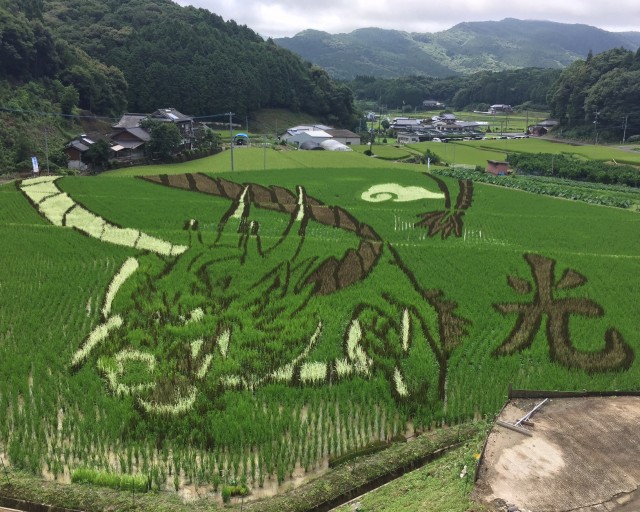Welcome to Europe-Japan Dynamics!
This is our blog page.
Please click here for what we do.
Please click here for who we are.
************************************
Pick of the week from Japan, 10 – 14 July
13 Jul. Dragon flying down from the sky — the art in the rice field in Amakusa, Kumamoto
With rice of different colors, the rice field art makes in full bloom you in Yamaura district of Matsushimamachi Kyoragi, Kamiamakusa-shi, Kumamoto. The work is created by local high school students who planted five kinds of rice, including the ancient rice, in June. One may enjoy it until the middle of October.
The Japanese green is wet — every time I look down the Narita area from the window of an airplane when approaching to the Narita International Airport, I see the difference in the green color of rice field, woods and orchards between the impression of the green between Japan and Europe. The European green is dry.
The Japanese traditionally planted the young shoot of rice by hand. This still is the practice for most of the farmers.
Hence the art like the one in the photo is possible.
Rice growing is very labour intensive. It requires villagers to get together and work together to maintain infrastructure needed for rice growing. Water supply system, cultivating the land in early spring, to name just a few.
An american business man I met said that he had been frustrated by “the group culture” by the Japanese when he has been stationed there. He wanted to talk to a person but Japanese always responded him as a role player in a group to which he/she belongs to.
I think he should have modified his communication to be appropriate in a group culture, forgetting the American way. The American green is dry, as compared to Japanese.
A group culture sometimes produces such a beautiful scene by planting the rice by hand according to a carefully organised plan.

- The news items referred here are picked up from “Asahi Digital”, and translated by Europe-Japan Dynamics. The cited titles or articles are not an official translation by the Asahi Newspaper.
************************************
- Interested in our cross-cultural trainings, coaching and consulting to move forward business with Japan? Please talk to us.
